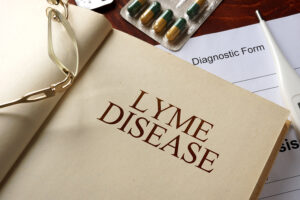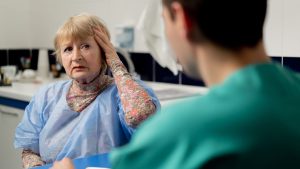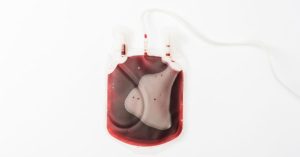
Physicians who prescribe no more than a three-week course of antibiotics will typically recommend watchful waiting rather than prescribing additional antibiotic treatment for patients suffering with persistent symptoms. However, two leading research groups have described the dangers in not taking action.
Investigators at Johns Hopkins University School of Medicine reported that 11 (14.47%) of their patients suffered from PTLDS at either the 6- or 12-month follow-up visit, despite receiving a one-time, 3-week course of doxycycline. [1] An additional 29 (38.16%) remained symptomatic. Only 36 (47.37%) of the Hopkins patients returned to their usual health at six and twelve months. [1]
More than 50% of the patients remained ill 6 to 12 months after their initial treatment for Lyme disease, according to the Johns Hopkins study.
Meanwhile, investigators at New York Medical College (NYMC) looked at patients with culture-confirmed early Lyme disease, 11 to 20 years after they received antibiotic treatment. They found that 11% of patients, with a mean age of 45, suffered from PTLDS after receiving prompt treatment. [2] In addition, 66.2% of women and 73.7% of men in their study developed intercurrent co-morbidity. And 57.9% of women and 40.8% of men required intercurrent hospitalizations. The NYMC authors did not disclose whether any of their patients’ intercurrent illnesses or hospitalizations were related to Lyme disease.
Retreatment approach to Lyme disease
The Johns Hopkins investigators pointed out that physicians in actual practice are retreating patients with antibiotics despite recommendations by some in the medical community to simply take the watch and wait approach. “The use of short-term antibiotic retreatment in the early, post-treatment phase of Lyme disease has yet to be formally tested, although it may be widely applied in clinical practice.” [3,4]
A study, in fact, exploring the health insurance claims database confirmed that retreatment is widely practiced. [5] The database identified 488 doctors who prescribed longer courses of antibiotics with 18% of Lyme disease patients prescribed long-term antibiotics for an average of 86 days. The study also found 43% of patients were switched from one antibiotic to another, while 18% were prescribed combinations of antibiotics.
The one size fits all approach is not effective in successfully treating Lyme disease. It would be reasonable to inform patients that doctors are divided on the watchful waiting approach and the efficacy of retreating patients. It would also be reasonable to develop protocols that are effective for patients to avoid Post-Treatment Lyme Disease Syndrome. When inaction leaves more than half of patients ill, the decision to watch and wait is not neutral—it is an ethical one, a theme I explore in the ethics of Lyme disease diagnosis and treatment.
References:
- Aucott JN, Soloski MJ, Rebman AW, et al. CCL19 as a Chemokine Risk Factor for Post-Treatment Lyme Disease Syndrome: A Prospective Clinical Cohort Study. Clin Vaccine Immunol. 2016.
- Weitzner E, Visintainer P, Wormser GP. Comparison of males versus females with culture-confirmed early Lyme disease at presentation and at 11-20 years after diagnosis. Diagn Microbiol Infect Dis. 2016.
- Nadelman RB, Luger SW, Frank E, Wisniewski M, Collins JJ, Wormser GP. Comparison of cefuroxime axetil and doxycycline in the treatment of early Lyme disease. Ann Intern Med. 1992;117(4):273-280.
- Massarotti EM, Luger SW, Rahn DW, et al. Treatment of early Lyme disease. Am J Med. 1992;92(4):396-403.
- Tseng YJ, Cami A, Goldmann DA, DeMaria A, Jr., Mandl KD. Incidence and Patterns of Extended-Course Antibiotic Therapy in Patients Evaluated for Lyme Disease. Clin Infect Dis. 2015.




I have been diagnosed with acute Lymes disease several years ago. I had since had breast augmentations and was deemed disabled one year later. I have neck and back pain- immflamtion from scar tissue in hips- spondylitis- mayo facial- and major musculoskeletal issues that cause spasms 80% of my day- need a cane to just support my weight most days. I have a knowing’ I have BII Breast implant illness due to Lymes attacking the foreign object in my body. I’m scared to death I have mold in sub-muscular implants and pain from them. The complicates from Lymes and implants has cost me depression and full body musculoskeletal spasms. I am on a lot of different mess. But proud to say I’m doing it all Opiate free. Which is not easy road to travel. My insurance won’t cover an explant and I just KNOW if I got my implants removed more than half of my health issues would dissipate. I have a team of dry. Including a rheumatologist. What’s your opinion on what I should do? I get brain fog, confused easily, can’t add properly or speak without mixing up my words, diagnosed with depression among other muscular issues. I feel like the Lymes is mimmoking a lot of my disabilities and I have been misdiagnosed many times! I have Medicare and Medicaid! No one will help me, I don’t know where to turn since most doctors are uneducated. What should I do? Your my only hope- Jessica Johnson Im**********@***il.com. Please read my story at
http://Www.gofundme.com/operatiomjessica
Oops sorry. http://Www.gofundme.com/operationjessica I spelled it wrong. Please. Read my story and see if you find any similarities! I also been having sides of mf my neck swell up & tingle and close off half my airway. And newer symptom is vision disturbingses PLEASE HELP
Please lord let this doctor help me- Jessica
Two weeks later, their suspicions were confirmed: McWilliams tested positive for Lyme. After a course of antibiotics, the disease and her symptoms disappeared.